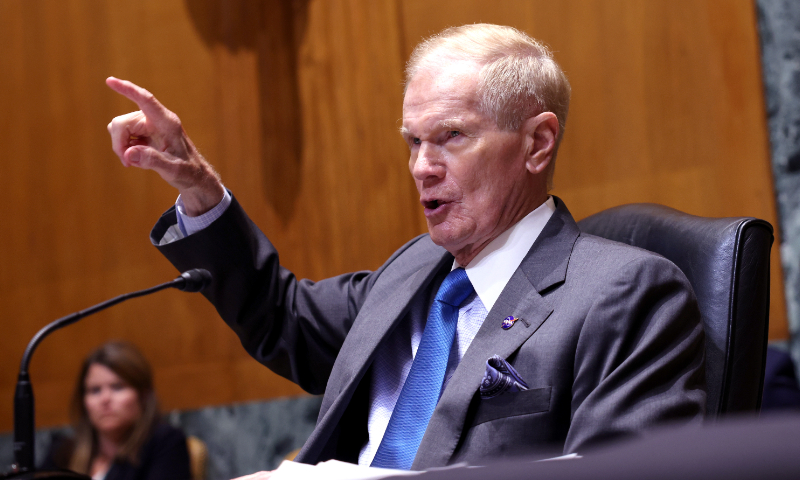
National Aeronautics and Space Administration (NASA) Administrator Bill Nelson. File Photo: VCG
Bill Nelson, head of US space agency NASA, has revealed that in order to join world scientists in analyzing rocks retrieved by China from the moon, he has engaged with American lawmakers to dismiss "national security" concerns and believes that talks on the issue with China will end "positively."
Nelson's gesture epitomizes the US' "divided" mind-set in engaging with China - it remains entrenched in Cold War thinking, seeking various restrictions on China, while in light of the current setbacks in lunar exploration it pursues cooperation, Chinese observers said.
They suggested that to launch real cooperation with China, it is essential for Washington to face up to its current state of lunar exploration technology and correct the US government's understanding of its policy toward China, adding that China is open to having space exchanges with the US.
Nelson said officials with his agency have been discussing with their Chinese counterparts the terms of Beijing's loan agreement for the Chang'e-5 moon rocks after he assured US lawmakers "a month or two ago" that the talks would not pose national security concerns, Reuters reported.
"We are now going through further clarification" with China, Nelson told Reuters at the International Astronautical Congress, a gathering of the world's space agencies, in Milan. Nelson said he thinks the talks will end "positively," with China agreeing to provide access to samples.
The US space agency's interest in collaborating with China to study moon rocks comes alongside China's increasing capabilities in space exploration.
China's Chang'e-5 mission successfully retrieved 1,731 grams of lunar samples at the end of 2020, making China the third country to collect rocks from the lunar surface.
The first batch of lunar samples from the far side of the moon, collected by China's Chang'e-6 mission, is expected to be distributed to domestic scientists by the end of 2024, with availability for international researchers to follow.
The last lunar samples collected by the US were obtained during the manned Apollo 17 mission, which returned to Earth on December 14, 1972, media reported.
Nelson's optimism in asking for samples from China may be an attempt to create a positive atmosphere and persuade the Congress to advance negotiations with China, Kang Guohua, a professor of Aerospace Engineering at Nanjing University of Aeronautics and Astronautics, told the Global Times on Thursday.
From the perspective of space engagement between China and US, Kang said that the US has exhibited a "divided" mind-set. On the one hand, some in Congress remain entrenched in Cold War thinking, believing that cooperation with China should be limited to prevent technology theft, while on the other hand, in light of the current setbacks in lunar exploration, others seek to downplay the impact of restrictions like the Wolf Amendment on bilateral space collaboration to foster cooperation.
To overcome this "divided" mind-set, the US must first face up to the current state of lunar exploration technology between the two countries, and should also abandon the "Cold War" mentality, seek common ground and opportunities for collaboration, and promote mutually beneficial cooperation in the field of aerospace, Kang said.
Collaboration on space has long been hampered by the Wolf Amendment, named after now-retired US congressman Frank Wolf. Under this law, NASA must work with the FBI to certify to Congress that any such talks with China would not threaten US national security, according to Reuters.
Chinese Foreign Ministry spokesperson Mao Ning said in July that China is open to having space exchanges with the US, but the real question is whether US scientists and institutions are allowed by their own government to participate in cooperation with China, Mao said.
"A notable characteristic of US behavior in engaging with other countries is that when it feels it is in need of others, it seeks dialogue, otherwise it pursues suppression of others," Li Haidong, a professor from the China Foreign Affairs University, told the Global Times.
The US views China-US aerospace exchanges through an absolute security lens. It is essential to correct the US understanding of its policy toward China. If this understanding remains flawed, discussions on various topics, including aerospace, will continue to hit dead ends, Li added.




